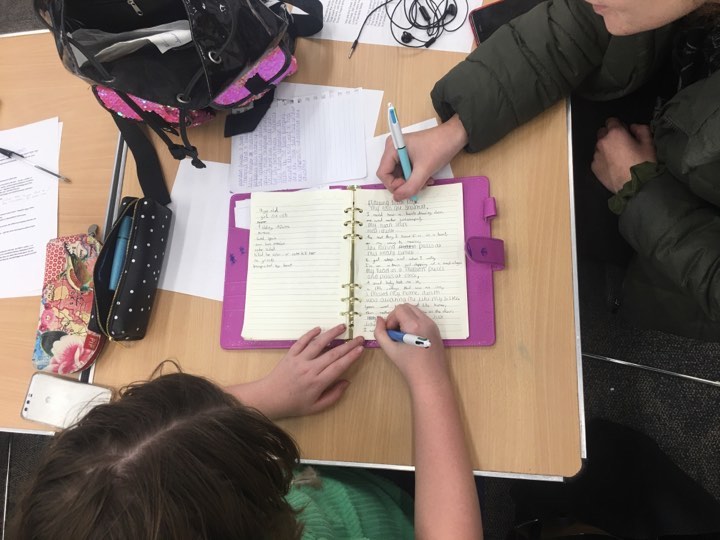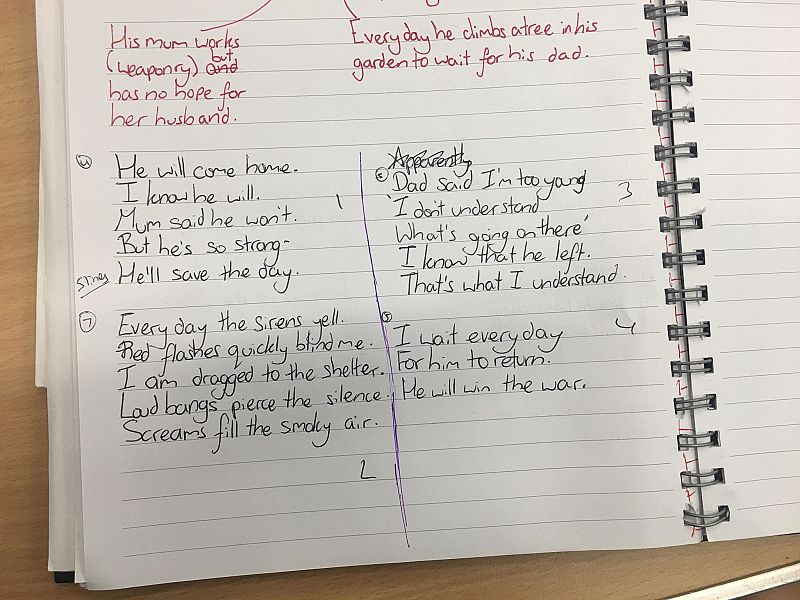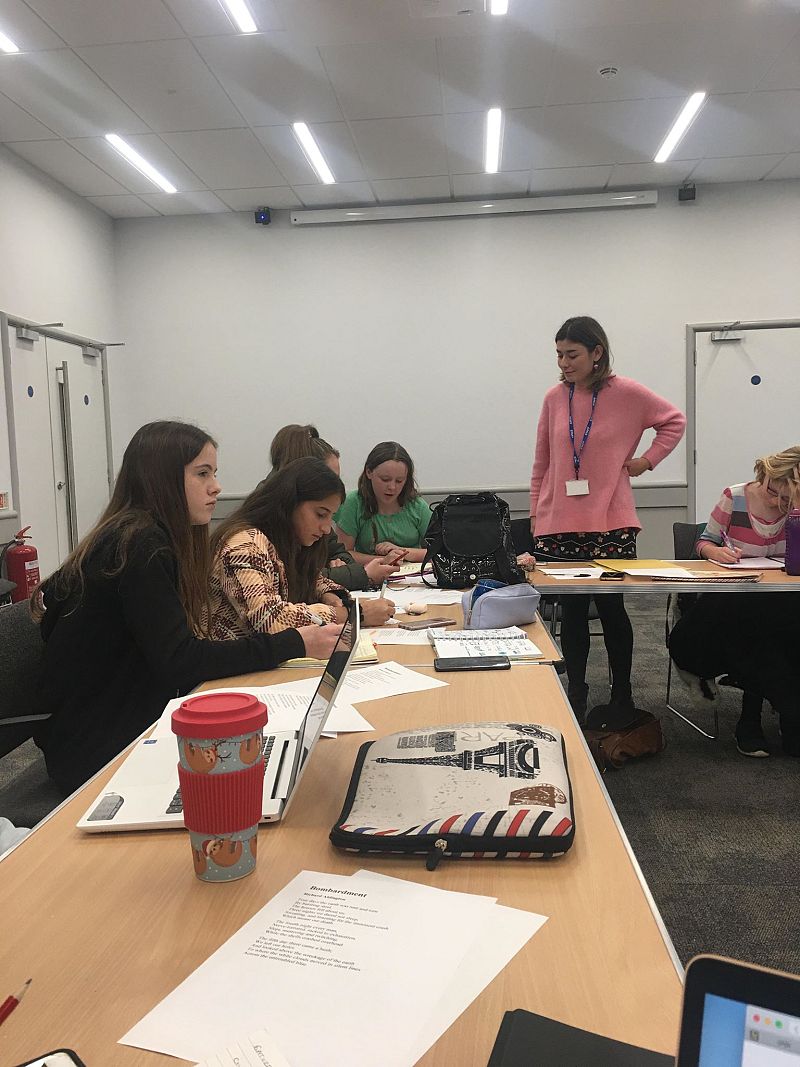09 November 2019
Posted by Lucy Pearce

War Poems
11-14 Age Group, 16 Attending
This week, Young Writers was focussed on War Poetry, inspired by the upcoming Memorial Day.
To kick off the session we first focussed on similes/metaphors, and came up with some of our own. By using similes, the young writers are able to inject their poems with strong, tangible images. The given by Tabby were:
Mud
Sleep
Sunset
Poppies
Crash
A few examples of the young writer's similes were:
The poppies were as red as the blood of the fallen.
The sunset spread across the sky like wildfire.
Mud sticks like superglue.
As a group, we read through In Flanders Field by John McCrae and discussed what we thought it could mean. We pulled apart the metaphors including the 'torch' - the symbol of light, and of passing on the flame.
Then, inspired by this same poem the young writers were asked to write their own poem from a narrative point of view of someone in a similar situation, about POPPIES.
Sky wrote:
In Flanders Fields the poppies grow,
down on the mud where the soldiers show
they mark our earth; in the sky
are where the spirits of the fallen fly
They fought for us, they bled for us,
and now all that's left to discuss:
is the grey, dark sky filled with dust,
and the useless guns, covered in rust.
After a short break, the young writers then read and analysed Bombardment by Richard Aldington.
We discussed the meaning of the poem and how in this poem, the narrator is in the trenches himself, and that the overall theme is much darker and gloomier than In Flanders Field. After reading Bombardment and recognising it as a more 'realistic' poem, the young writers were then asked to sit in pairs and create a character that would have been involved in the war, e.g. a nurse, an army general, a housewife, etc.
Some of the characters created by the young writers included:
- A 43 year old mother from Cornwall waiting for news from her soldier son
- A woman disguised as a man in order to be allowed to fight
- A 7 year old daughter waiting for her father to return from war
- A fighter pilot who had his hand blown off in a crash, but is later built a mechanical hand by his father (a bit more SiFi than the others!)
From these characters, the young writers then wrote poems which reflected their lives and feelings.
Gracie wrote:
Why didn't I take my chances,
tell tear girl I liked her, ask her to the dances?
Now that I'm on deaths door,
I do nothing but regret not doing it all before.
Before my world turned into blood,
before I slept with nothing but corpses and mud,
all I see are my friends, my enemies bones,
watch them be buried beneath anonymous headstones.
I just want to go home,
Erase all these memories from my head,
I just want to go home,
go home before I wind up dead.
15-18 Age Group, 14 Attending
Jumping straight into the thick of war poetry, the young writers read through a selection of sonnets including Pain by Ivor Gurney, Anthem For Doomed Youth by Wilfred Owen, and When You See Millions of the Mouthless Dead by Charles Hamilton Sorley, and discussed what they found to be interesting/powerful/emotive etc.
We agreed that The Soldier by Rupert Brooke is a poem which displays hope from death, and is interesting how the rhyme dwindles towards the end of the poem. Anthem For Doomed Youth was read as a more realistic representation of war, and stripped of any beauty and patriarchy. Archie felt that When You See Millions of the Mouthless Dead is almost an opposite of The Soldier, in that its too late for apologies as no one, who deserves to, can hear you. All poems had a mixture of rhyme schemes, tones, and narrative positions relating to the war.
The young writers were then asked to imagine that they were either in the war, or looking back at the war, and to write a sonnet. A sonnet is a poem of 14 lines adhering to the syllabic scheme of a iambic pentameter on 10 syllables per line. However, the only needed to focus on making it 14 lines and using any rhyme scheme they liked.
To warm up and give the young writers some substance before hopping straight into the sonnets, we played the simile and metaphor game, in which the writers had to come up with similes and metaphors to describe the words: mud, sunset, trench, barbed wire, frost, and poppies. Then then had to write lines that rhyme with: dawn, blood, stars, hope, rain, and attack. Then write 10 syllable lines from specific topics that Tabby curated - e.g. 'a soldier waking up'.
After this, the young writers wrote their powerful war sonnets.
George wrote:
Truly this is our darkest hour
Where a small child holds all the power
Where fields are shelled and terror formed
I wish this happened, never more
Truly this is our darkest night
As the age changes, so does wrong and right
As the sun retreats, men fall into slop
As a moustached gent shouts "over the top!"
Truly this is our darkest day
For bonds in blood we must repay
The blood of young men, almost children
Drip away onto muddy dens
Truly this is our darkest age
As we bleed to break from our cage
Ameera, one of our brand new young writers, wrote:
The mud ties me to the fields like shackles of slaves,
Stark and crisp the morning mist shot my breath,
Pouring light into the distance, the sunrise had a dance of death,
Trench you are my protector, however cold like graves.
Prickling like sulphur gas, the frost itches my skin,
Once eating a feast, now a morsel,
I am so thin
The barbed wire decorated no mans land,
like cobwebs - a reminder it will soon be my time to stand
Stand there, out there where bullets will pulse me with pain,
Echos of screams as I go insane,
The only memories of my comrades in a bloodstain
My heavy bags packed, like the weight of freedom,
Responsible for my country however I'm no martyrdom


Archive
Junior & Young Writers Week 3: Return From The Magical World
Junior & Young Writers Week 2: African Mythology
Problems, Problems, Problems...
Cautionary Tales & Christmassy Opening Lines
You've Gotta Have Pace, Pace, Pace
Junior & Young Writers Week 1: Alien Encounters
Junior & Young Writers: Week 5 - Play on Words Pt. 2
Junior & Young Writers: Week 11 - end of term showcase [build a bard workshop]
Junior & Young Writers: Week 10 - Greek Theatre - chorus stories
Junior & Young Writers: Week 9 - Greek Origin Stories - Spring
Rubber Ducks & Writing Festivals
Junior & Young Writers: Week 7 - Greek Hero Stories [the 12 labours of Hercules]
Junior & Young Writers: Week 12 [Wild Words] - Stuff & Things
Junior & Young Writers: Week 11 [Wild Words] - World Building 2
Junior & Young Writers: Week 10 [Wild Words] - World Building
Junior & Young Writers: Week 9 [Wild Words] - Mystery & Choose Your Own Adventure
Junior & Young Writers: Week 8 [Wild Words] - Spooky Sequels & Potion Poems
Junior & Young Writers – Week 10 (Writers’ Inspiration) – Final Showcase
Junior & Young Writers – Week 9 (Writers’ Inspiration) – Editing & Performance Tips
Junior & Young Writers – Week 8 (Writers’ Inspiration) – Cuteness
Time goes on by Tavinder Kaur New
Junior & Young Writers – Week 7 (Writers’ Inspiration) – Natural Solutions
Junior & Young Writers – Week 6 (Writers’ Inspiration) – The Language of Fruit and Veg
Junior & Young Writers – Week 5 (Writers’ Inspiration) – Adventures In Space
Tinklebobs and Bedraggled Angles
Junior & Young Writers – Week 4 (Writers’ Inspiration) – Our Environment
Fortune Tellers & Future Letters
Junior & Young Writers – Week 3 (Writers’ Inspiration) – Home
Young Writers - Week 10 (The Art of Writing) – Final Week Showcase
Junior Writers - Week 10 (The Art of Writing) – Final Week Showcase
Young Writers – Week 9 (The Art of Writing) – Choose Your Own Adventure
Junior Writers – Week 9 (The Art of Writing) – Choose Your Own Adventure
Young Writers – Week 8 (The Art of Writing) – Sequel Stories
Junior Writers – Week 8 (The Art of Writing) – Sequel Stories
Young Writers – Week 7 (The Art of Writing) – Picture Prompts
Junior Writers – Week 7 (The Art of Writing) – Picture Prompts
Young Writers - Week 6 (The Art of Writing) - Script-writing & Dialogue
Junior Writers - Week 6 (The Art of Writing) - Script-writing & Dialogue
Junior Writers – Week 5 (The Art of Writing) – Poetry
Young Writers - Week 5 (The Art of Writing) - Poetry Potions
Edward The Martyr - A Competition!
Mood Boards and Postcards from Space
Young Writers - Week 3 (The Art of Writing) - PLOT
Junior Writers - Week 3 (The Art of Writing) - PLOT
Moomin Stories and Hollywood Pitches
Young Writers - Week 2 (The Art of Writing) - Genre & Setting
Junior Writers - Week 2 (The Art of Writing) - Genre & Setting
Prompts, Dialogues, and Cliché
Story Structure Part One: Exposition and Beyond...
Young Writers - Week 1 (The Art of Writing) - Character
Junior Writers - Week 1 (The Art of Writing) - Character
Young Writers - week 4 - Nature Writing [animals & wildlife]
Junior Writers - week 4 - Nature Writing [animals & wildlife]
Young Writers - week 3 - Nature Writing [trees/plants/flowers]
Junior Writers - week 3 - Nature Writing [trees/plants/flowers]
Young Writers - week 2 - 'fractured fairy tales'
Junior Writers - week 2 - 'fractured fairy tales'
Young Writers - week 1 - 'from deep inside a forest'
Creating Communities through Writing
WORDCUP - Hounsdown Session #6
Making pillows in a house full of feathers
WORDCUP - Hounsdown Session #5
Exploring home – a place, person, house
WORDCUP - Hounsdown Session #4
Stories From Our Streets at the Abbeyfield Wessex Society Reminiscence Session at Poole Library
What Do You Really Mean? Writing Dialogue for Scripts
WORDCUP - Hounsdown Session #3
Character Building & Murder Mysteries
Going inside – from a spark to a story
WORDCUP - Hounsdown Session #2
Maybe I Can Be Invisible After All... Monologues
Creative Writing: Fun Facts, Diverse Voices and Different Perspectives
Writing Competition - Stories From Our Streets
Stories From Our Streets Community Activity Pack
Thinking in-quiet, after the fire
Found Cities, Lost Objects: Women in the City Curated by Lubaina Himid CBE
Ekphrastic Jukebox - Writing to Music
ArtfulScribe LitFest Community Showcase 2023
Young writers exercise their creative power
Writing to The Sorcerer's Apprentice
The Mousetrap - Mayflower Young and Junior Writers Investigate Mystery!
Stories From Our Streets Launch!
Interview: In Conversation with Dr Victoria Leslie
The Missing Farmer/ Blackout Poetry & DADA
Exploring this wonderful World
Using props to create characters/ working as a writing room
Stories of the Dust and Character Questions
Storytelling and Escalation or Rising Action
Junior Writers Club Acrostic Poem
Notes on Intention for MAST Collective - Year 3 - Facilitation Focus
Earthquakes & Dominoes - MAST Collective Blog #4
SUPER MARIO AND POP CULTURE POEMS
Receptionists & Inky Voids - MAST Collective Blog #3
Saying No and saying YES on National Poetry Day!
There's a Dragon in the Wardrobe...
House Warming Party (The Mortifying Ordeal of Being Known) - MAST Collective Blog #2
Intern Blog 5 - The Publishing Process
POEMS TO SOLVE THE CLIMATE CRISIS
On The Streets With Theresa Lola
Intern Blog 4 - The Internship Journey
NEW DIRECTIONS, STARTING SMALL - THE ORWELL YOUTH PRIZE
LIGHTHOUSES, HOPE AND METAPHORS
on workshop and transformations: frogs, lions, and the duck that becomes a larder...
Poetry Ambassadors - Interview with April Egan
Intern Blog 1 - Finding a Voice
World Poetry Day: Fluffypunk and the Invisible Women
On Being a Writer: A Conversation by Beth Phillips & Sam Morton
Poetry Ambassadors - Interview with Kaycee Hill
UNHEARD VOICES: INTERNATIONAL WOMEN'S DAY, AND STORIES OF CONFLICT













